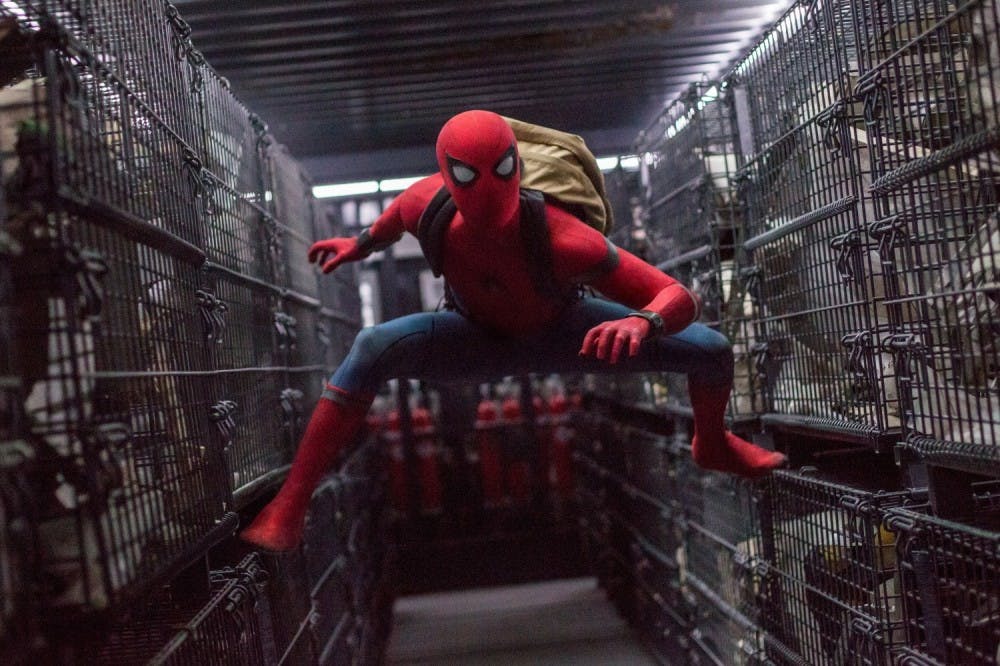By Simon Tessmer
Editor's Note: There Will Be Criticism is a weekly column by Simon Tessmer, a film student at MSU. Tessmer's other reviews can be read on his blog.

IMDB | Photo by Chuck Zlotnick - © 2017 CTMG, Inc. All rights reserved.
By Simon Tessmer
Editor's Note: There Will Be Criticism is a weekly column by Simon Tessmer, a film student at MSU. Tessmer's other reviews can be read on his blog.
I have an emotional connection with "Spider-Man." I was six years old when Sam Raimi’s inaugural adaptation materialized in 2002. Despite my age-related inability to endure Tobey Maguire’s reduction of Willem Dafoe’s Green Goblin into a slow-motion bloody pulp, I became enamored over the aesthetic of a high-school boy in red and blue tights scaling buildings and shooting webs, as revealed by the film’s trailer alone.
I wanted badly to see it, and my parents met me halfway with the purchase of Marvel’s graphic novelization of the film, which I read cover-to-cover until I had the movie beat-by-beat memorized. I poured over Peter Parker’s animated features, I scoured the Okemos Library for anthologies of original "Spider-Man" comics, I nagged my mother to buy Marvel “How to Draw” books, I stared at a massive "Spider-Man" poster taped to my bedroom wall every night, and when I was deemed mature enough to consume Raimi’s film I watched and re-watched it religiously on videotape.
Viewing "Spider-Man: Homecoming" on a Sunday afternoon in a terrible seat amid a crowded Chicago AMC reconnected me with my dormant excitement for the wall-crawling hero. I felt my gut wrench with joy and giddy love for Tom Holland’s Peter Parker, as he performed ludicrous stunts with doe-eyed innocence, while wading through high-school drama in a pitch-perfect manner that hints at "The 400 Blows (1959)" and deeply resonates with "Buffy the Vampire Slayer (1997-2003)."
"Spider-Man: Homecoming" functions beautifully as a vehicle for childhood excitement largely due to its refreshingly uncynical take on high school life. Peter Parker is an excitedly nerdy freshman with a similarly upbeat best friend — Ned, played by Jacob Batalon — who endures bullying but isn’t heartbroken over it, has a crush on the captain of the academic decathlon team Liz (Laura Harrier) and is tired of condescension from adult forces outside of his control.
Peter’s youthful obstacles are treated with a genuine sunshine that works to complicate the audience’s relationship with the villainous Vulture (Michael Keaton), who’s similarly motivated by fatigue over uncontrollable externalities. It lends the film a periodic resemblance to François Truffaut’s "The 400 Blows." By simultaneously retaining a childlike sense of amazement and wonder for its fantasy action, "Spider-Man: Homecoming" makes the straightforwardly positive tonal moves most contemporary superhero films either ignore or consciously push against.
This most recent "Spider-Man" film further perfects its treatment of youth by taking cues from "Buffy the Vampire Slayer" and lightly framing Peter’s supernatural life as a metaphor for common high-school struggles, including the anxiety of young love, the desire to appear cool and the frustration at not being taken seriously by adults. Homecoming then improves on Buffy’s model by counterbalancing its relatable drama with properly taut and grandiose action sequences, rife with terrifying villains, awe-inspiring set pieces and a rumbling sound design that should incentivize theatre attendance.
Garnished with comedic touches by the brilliant Hannibal Buress, Martin Starr and Donald Glover, "Spider-Man: Homecoming" is the kind of film that would have had six-year-old Simon leaping with excitement. It’s a funny, thrilling and scary ride that taps into America’s splendiferous cinematic history of colorful high-school depictions, and generates the full-bodied joy I experienced while staring at the huge "Spider-Man" poster plastered on my bedroom wall.
Rating: 4/5
Support student media! Please consider donating to The State News and help fund the future of journalism.